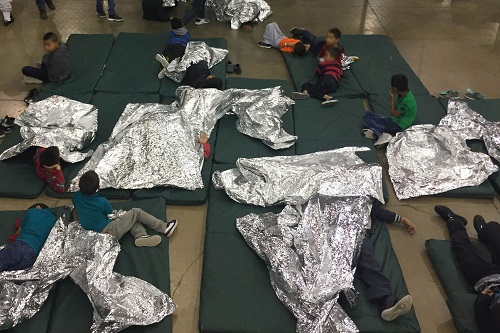Reuters photo
By
Tom Arms
The inhumane separation in America of wannabe immigrants and their children is over. Well, not quite.
The Trump Administration’s decision to detain parents and children together has not been given a start date and when it does start it will last only 20 days unless the administration can obtain a modification for something called the Flores Agreement. That modification could lead to indefinite detentions for entire families.
There is also the unpalatable fact that Trump’s executive order does not apply to the more than 2,000 separated children currently scattered across 100 detention centres, a tent city and in foster homes.
Immigration and Customs Enforcement (ICE) has said it will set up a hotline for parents to call after they are released from custody. However, a former ICE director has said that some family separations will be permanent and that it is likely that the children will be held for up to two months after their parents’ release.
Here is how the system worked: A family enters the US illegally. Parents are immediately arrested and sent to prison instead of being issued with a court summons as was previously the case. Because children are not allowed to go to prison with their parents, they have been detained in one of 100 centres managed by the Office of Refugee Resettlement.
When the parents appear in court they usually plead guilty because they want to be reunited with their children. As soon as the judge’s gavel comes crashing down the parents are marched to the nearest plane back to El Salvador, Mexico, and Guatemala or from wherever they came.
They fly out without their children. They can only apply to be reunited with their children from their country of origin. While their application is being considered the children either remain in the detention centre or are placed in a foster home. How the children are returned to their parents is undetermined.
Then there is the 1997 Flores Agreement that strictly limits the government’s ability to keep children in immigration detention centres. The agreement has its roots in a series of law suits filed in the 1980s by the American Civil Liberties Union and others. It owes its name to 15-year-old Jenny Lisette Flores who fled El Salvador in search of her US-based aunt.
She was detained at the US border, strip-searched and housed with adult male and female illegal immigrants. She was informed that she could be released only to her parents—not her aunt. The ACLU argued through the courts that Flores had a constitutional right to be released to “responsible” adults.
A Supreme Court ruling was avoided by the Clinton Administration with an agreement that set standards for unaccompanied minors in the custody of federal authorities. The government was required to release children within 20 days to their parents, a legal guardian, another relative or a vetted person willing to take legal custody.
The Flores settlement was designed to apply to the fate of “unaccompanied children”—not children accompanied by their parents or a close adult relative. In 2014, however, the Obama administration attempted to curb asylum-seekers by keeping families in detention and processing and deporting them as quickly as possible.
The pro-immigration lobby successfully challenged this policy in the courts and the Ninth Circuit ruled that the Flores settlement covered accompanied and unaccompanied children and that the government could detain them for no more than 20 days. What happens after 20 days has never been spelled out but in practice the families have simply been released into the community.
President Trump wants to end Flores because he sees it as another variation of “catch and release.” On the other hand, keeping families together in an immigration detention centre would suit the administration. It’s cheaper and the courts could handle the family as one case with one shot to enter the US. They just have to be held for longer than 20 days because there is no way that the system can process the cases before the Flores deadline.
If Flores is modified then wannabe immigrant families could be held in detention centres for months—even years—while they wait for their cases to be heard. Trump would then have another deterrent.
Tom Arms
I am a journalist, entrepreneur and historian with extensive experience in print, web and broadcast journalism. I started as a diplomatic correspondent, wrote several books (The Falklands Crisis, World Elections On File and the Encyclopedia of the Cold War), and then in 1987 started my own business (Future Events News Service, www.fensinformation.com) which over 25 years established itself as the world and UK media’s diary. Our strapline was: “We set the world’s news agenda.” I sold FENS in December 2012 but retained the exclusive broadcast rights to all of FENS data. To exploit these rights I set up LookAhead TV which produces unique programmes which “Broadcasts Tomorrow Today” so that viewers can “Plan to Participate.” LookAhead has appeared regularly on Vox Africa, Radio Tatras International, The Conversation and Voice of Africa Radio.
In addition to being a syndicated broadcaster and columnist on global affairs, Tom is also available for speaking engagements and can be contacted on Twitter, Linkedin and email: [email protected].



No Comments Yet!
You can be first to comment this post!